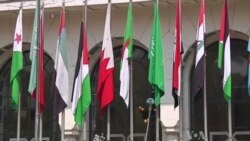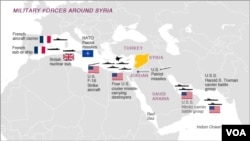CAIRO —
The threat of a U.S. military strike on Syria in response to an alleged chemical weapon attack by the Assad government has set an already tense Middle East further on edge.
The carnage near Damascus last week has appalled many throughout the Middle East. But possible retaliation by the United States, acting alone or in partnership, has left others equally unsettled.
Policy analyst Joel Rubin, of the Ploughshares Fund, says Washington might wait until it has broader support for any military action.
"It is possible that the administration will want to go to the United Nations, will want to seek some level of affirmation for those efforts to get some legitimacy from an international body. It’s not 100 percent clear that they will do that," he said.
The U.S. has failed to get regional backing. The Arab League - which two years ago approved Western military intervention in Libya - is pressing for a diplomatic resolution.
"Clearly a lot of members of the Arab League probably unofficially support these strikes but, in terms of the domestic message, American strikes and Western military operations in the Middle East are still very contentious and potentially sources of instability and discontent,” said Syria analyst Torbjorn Soltveldt, of Maplecroft Risk Assessment, speaking to VOA via Skype.
Many nations in the Middle East are already facing political unrest, with anti-American sentiment running high. A U.S. strike before U.N. inspectors have determined who carried out the chemical attack could spark more anti-American feeling.
Also, some of the evidence being cited against the Syrian government is reportedly coming from Israel and that only heightens doubt in a region deeply suspicious of America's ally.
"In the U.S. you have a problem with your political credibility in dealing with Arab countries," said Mustafa Labbad, the director of the Al-Sharq Center for Regional and Strategic Studies in Cairo. "Iraq was accused of having weapons of mass destruction and, after the invasion, all the world saw it was a lie."
He says people across the region could take to the streets over what they see as hypocrisy.
"There is no evidence that Syria used chemical weapons. That Bashar al-Assad is a dictator? He is. But other U.S. allies are also as well dictators," he said.
Labbad says there is one saving grace to reported U.S. plans to use military strikes - that they're apparently not aimed at toppling Assad. He says the alternative - the possibility of anarchy or of jihadi successors, and an even more Syrian refugees, has many in the already unstable region alarmed.
The carnage near Damascus last week has appalled many throughout the Middle East. But possible retaliation by the United States, acting alone or in partnership, has left others equally unsettled.
Policy analyst Joel Rubin, of the Ploughshares Fund, says Washington might wait until it has broader support for any military action.
"It is possible that the administration will want to go to the United Nations, will want to seek some level of affirmation for those efforts to get some legitimacy from an international body. It’s not 100 percent clear that they will do that," he said.
The U.S. has failed to get regional backing. The Arab League - which two years ago approved Western military intervention in Libya - is pressing for a diplomatic resolution.
"Clearly a lot of members of the Arab League probably unofficially support these strikes but, in terms of the domestic message, American strikes and Western military operations in the Middle East are still very contentious and potentially sources of instability and discontent,” said Syria analyst Torbjorn Soltveldt, of Maplecroft Risk Assessment, speaking to VOA via Skype.
Many nations in the Middle East are already facing political unrest, with anti-American sentiment running high. A U.S. strike before U.N. inspectors have determined who carried out the chemical attack could spark more anti-American feeling.
Also, some of the evidence being cited against the Syrian government is reportedly coming from Israel and that only heightens doubt in a region deeply suspicious of America's ally.
"In the U.S. you have a problem with your political credibility in dealing with Arab countries," said Mustafa Labbad, the director of the Al-Sharq Center for Regional and Strategic Studies in Cairo. "Iraq was accused of having weapons of mass destruction and, after the invasion, all the world saw it was a lie."
He says people across the region could take to the streets over what they see as hypocrisy.
"There is no evidence that Syria used chemical weapons. That Bashar al-Assad is a dictator? He is. But other U.S. allies are also as well dictators," he said.
Labbad says there is one saving grace to reported U.S. plans to use military strikes - that they're apparently not aimed at toppling Assad. He says the alternative - the possibility of anarchy or of jihadi successors, and an even more Syrian refugees, has many in the already unstable region alarmed.






